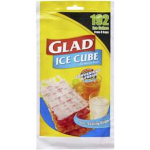For efficient ice, it's all about how fast you can freeze it. Three variables - the water, the ice container, and the fridge itself.
The fridge is a significant variable - how well insulated it is, how cool it gets, how often you are opening the freezer compartment, etc. will all have an impact on how long stuff takes to freeze for a given energy allotment. In general though, a highly insulated fridge that is kept closed while freezing is your best bet. In terms of temperature, we've not noticed a significant energy draw difference on our freezer when it's -15, -10, or even -5; the biggest difference in energy draw is the external temperature. In other words -- if it's 5 degrees outside, it doesn't seem to matter if we set the freezer to -15 or -5; it cycles roughly the same amount of times and uses roughly the same amount of energy. When it's 30 degrees outside, it cycles a lot more in general, but also a bit more for the colder temps though that seems less significant than ambient temp. In short: Get a good, well insulated fridge.
The ice container is the second variable. For speed, ditch the plastic and go with stainless steel. It will insulate far less and transfer more "cold" to the water. Keep in mind though this also means your ice will disappear a lot faster if you forget the tray on the picnic table.
And finally, for water temperature (and this is the curveball of all this) -- hot water will freeze faster than cold. It's called the Mpemba effect and while there are a lot of competing theories on how it works (or if it works at all in some circles), there's a fair bit of evidence to suggest that hot water will freeze faster than cold water, as counter-intuitive as that seems.
If are moving every day, the approach Alan suggests is a good one, using fully sealed ice trays to avoid spilling while the water freezes:
Amazon product ASIN B07NYVP6XH
